The great British childhood holidays we'll never forget
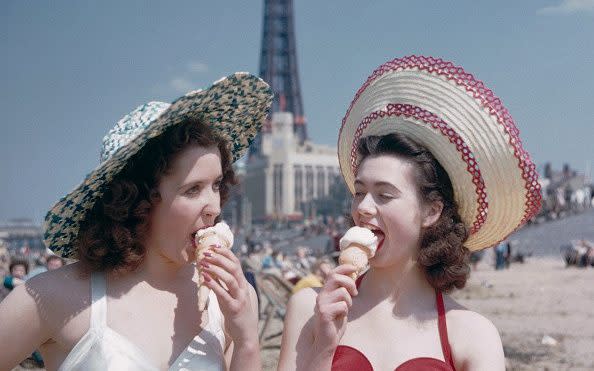
The past is a foreign country. Not literally of course for those of us with vivid memories of childhood holidays on temperate parts of the British coastline. Although we certainly did do things differently.
Those customs, the application of zero sun cream, the patient wait for the tide to come in, the headstrong plunge into the sea, the egg mayo sandwiches, may seem daftly quaint to a generation revolutionised by cheap flights to Europe. But with Santorini, Tuscany and now the CÔte d’Azur looking like a quarantine risk too far, this summer the humble British bucket and spade holiday is having an unlikely revival.
Those of us fortunate to remember them the first time, such as our 10 distinguished contributors here, are realising that the memories of our first British staycations still run through us like a stick of rock.
John Craven, broadcaster, remembers Bridlington, Yorkshire

Growing up in the greyness of post-war Leeds, the highlight of the year was climbing on board a Bedford Duple bus with my family every August and heading for a week on the Yorkshire coast. Our usual destination was Bridlington and though it was only 60 miles away the journey, with a comfort stop outside York, took forever for an excited child longing to see the sea.
After we checked into a boarding house (hotels were not within the means of the Cravens) it was down to the harbour to see the boats and then on to the glorious sandy beach and the welcoming waves. If it was raining, as it often was – no big deal.
The softness of the golden sand, the noise of the seagulls, the novelty of the amusement arcades and ice-cream parlours transported my sister Jean and I to another world in the days before we discovered there was an “abroad”.
Because of Covid-19, today’s generation of once globe-trotting children are staycationing in places like Brid, and the holiday wheel has turned full circle. Best bit of the week for me was a trip out to sea, across Bridlington Bay to Flamborough Head and back, in pleasure boats like the Yorkshire Belle.
In those days, the harbour had a fleet of distinctive, red-sailed wooden fishing boats called cobles. Now it’s “the lobster capital of Europe” but only a handful of the cobles are left.
A couple of years ago, while filming for Countryfile, I was allowed to take the tiller of one of them out in the bay – a boyhood dream come true.
Brid was also where, as I mention in my recent memoir Headlines and Hedgerows, in my mid-teens I got my first taste for journalism. The singing star David Whitfield was appearing at the Spa Theatre and I hung around the stage door with pencil and paper hoping, with the innocence of youth, to interview him for our church magazine.
Luckily, he stepped outside to get some sea air before his performance. There were no fans around except for me and, being a Yorkshireman himself, he said he admired my pluck and as we sat on a bench he treated me as if I was a Fleet Street feature writer.
That was my last family holiday at Brid, and because of David Whitfield I’ll never forget it.
Countryfile: A Picture of Britain, A Stunning Collection of Viewers’ Photography by John Craven and Matt Baker is published on Sept 3 (William Collins, £12.99)
Kate Spicer, writer remembers Cornwall

We went to a lot of different places on holiday when I was a kid and they were all in Cornwall. Two weeks in a holiday cottage somewhere or other between Trevarrian and Polzeath, which is now an actual fashionable middle class Mecca where people surf like Californians. We surfed on lollipop-stick wood boards.
The holiday began at 4am, an early start to beat the crowds. It was all about beating the crowds. That’s why we went in September, when other kids were back at school. Ah, the 1970s. We’d drive down the M5, then the A30, the car rammed, roof rack on, sandwiches packed. Stop to eat? Never! Only stop for wee-emergencies. These were my first experiences of dawn.
What do I remember? Pasties, I still love them, loads of spicy white pepper, swede and potato; the homoeopathic quantity of beef was less important than the thick crispy knot of pastry at the ends.
Digging holes that we were convinced would go all the way to Australia. Playing in the waves. Wanting to sunbathe like a grown up and being told to go off and play like a kid. I don’t remember a molecule of suntan lotion, ever.
Truly, simpler times with far better tans. In our modest telly-free holiday cottages, Dad ritually cooked off shallots, garlic and wine for moules marinière – we had all picked the mussels at low tide. The sense memory is acute: hot grassy dunes, springy coastal turf, sea spray from a speed boat, the crumbling sound of a sheer cliff path beneath flip flops, beery pubs smelt from the distance of a pub garden while clutching a warm sticky bottle of Coke and some crisps like an Olympic trophy.
The smell of vinegar chips and the pungent combination of seaweed and ozone. Shrimping nets, Cornish ice creams, fudge. Ahh, the fudge.
My sister Georgie and I were the same in that we longed for the hallowed day when we would be allowed to spend our pocket money at Cousin Ginny’s sweet shop in a pre-Rick Stein Padstow.
Less so, the Go Kart racing track where my family developed an early phobia of my driving. There were concerns, always, about the weather – would it be Monopoly, spooky small museums and picnics in the boot of the car, or baking on the beach?
This was the stretch of coastline that my stepmother, J B, knew from her own family hols and when her and Dad met up with her brothers and sisters, the adults would chill. Now was the time to ask for that second packet of cheese and onion.
Kate Spicer’s Lost Dog: a Love Story is available now in paperback (Ebury Press)
Dame Jacqueline Wilson, author, remembers Clacton-on-Sea
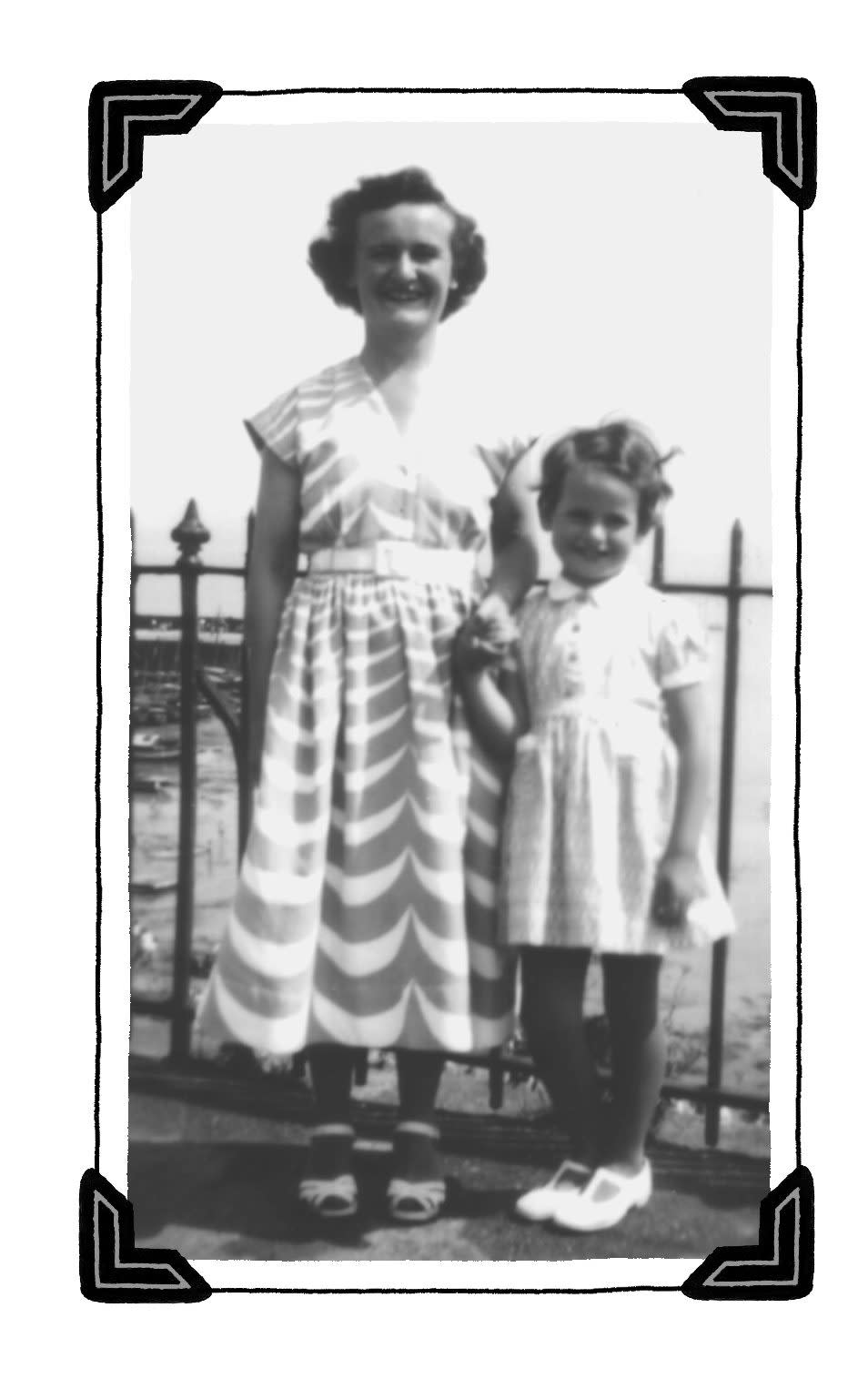
We only had a week’s summer holiday when I was a child, and I usually wasted the first day in bed with a bilious attack because I got so overexcited. It wasn’t because we were staying anywhere especially exotic.
We went to Waverley Hall at Clacton-on-Sea, a family hotel specially chosen because it wasn’t licensed. My parents were convinced that anyone who drank so much as a pre-dinner gin and tonic was a debauched alcoholic. Waverley Hall boasted respectable alternatives to a bar: a twice-weekly dance, a beetle drive and talent competition.
At the end of each week the hotel manager, Will Tull, took a photograph of all the guests. I’m looking at it now. All the women are stiffly permed and sitting up straight, the men sport open-necked shirts and short haircuts, and the children have very straight partings and white sandals. As an adult you would need several stiff gins to do the hokey-cokey in their company – but when I was a child Waverley Hall seemed as glamorous as Buckingham Palace.
Will Tull had us all singing. His speciality was The Music Man, and we had to join in pretending to be instruments. He organised novelty dances like the Paul Jones, and finished with a conga around the dance floor, through the kitchens, outside into the garden, and across the esplanade.
When I’d stopped throwing up, we spent the remaining six days on the sands. I went in swimming every morning and then sat in my damp ruched costume and a cardi. I made sandcastles with moats, and I’d people them with pink plastic dolls from Woolworths. If it rained we went on the pier.
My dad liked the pinball machines and my mum liked the bingo stalls, and once she won me a set of little plaster dogs. I still have them now, a souvenir of that long distant past.
Love Frankie by Jacqueline Wilson is out on Sept 17
Joanna Scanlan, actress, remembers North Wales

Where should a family in rural North Wales go for their summer holidays? North Wales of course! It was true for us in the 1960s – it’s a truism today.
Each summer for the first 10 years of my life we would drive the 50-odd miles from Flintshire along the North Wales riviera coast road, tooting our horn through the tunnels and landing up at my grandmother Peggy’s midcentury modern bungalow at Rhoscolyn.
The glorious picture windows looked out on to acres of wild rocky headland to Borthwen beach on Holy Island, Anglesey and across to the majesty of the Snowdonia mountains dropping into the Llŷn Peninsula.
I wasn’t surprised to hear that this same perfect beach reputedly later became a courting hot spot for the Duke and Duchess of Cambridge during his posting at nearby RAF Valley. The beach is an idyllic natural harbour, sandy and often calm – my father, Michael taught us how to swim here until we were strong enough to flail our arms and reach the Gwylanod islands at the end of the bay.
We had a wooden boat and would check the lobster pots daily, though I was squeamish and sad when they were dropped into the boiling water for supper.
My brother Patrick and I had a secret castle hewn from rock at the easterly end of the beach from which we spied bobs of seals, almighty jellyfish pulsing beneath the surface, choughs and cormorants darting for fish. It was a bucket and spade experience outstripped by the wild.
We learnt to respect the savagery of nature when to our horror one summer a child from a family we knew was sucked by a rogue wave from the headland and drowned. Some days we were housebound by sea frets, visibility down to a few feet, but mostly the days were sun-kissed and the evenings spent in a comforting ritual of my mother Patricia daubing calamine lotion on to sore burnt skin.
To cool down we would wander up to the caravan park café, buy a lolly and – if we could scrounge an extra sixpence – put The Rolling Stones’ Honky Tonk Women on the jukebox. We were in Rhoscolyn when Neil Armstrong took his first steps on the moon, though not allowed to stay up to watch it. Instead, we drove to Portmeirion to buy a commemorative mug.
Anglesey is rich in ancient myth, a place of spirit and mystery. I recall the sheer incalculable fun of those holidays, so much so that the habit of an annual British Isles summer trip is one I have never missed.
Henry Holland, fashion designer, remembers Silverdale, Lancashire
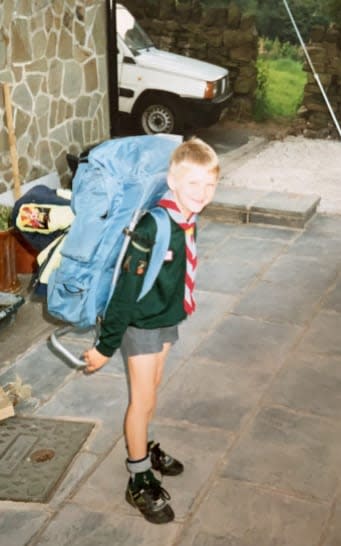
When I was quite young, we had some really good camping holidays in Silverdale, not that far from where we lived in Lancashire.
All of us in a five-man tent and washing in the river. I don’t think I’d be so into it now. Especially as I once went to Tanzania with Oxfam and electrocuted myself in the one hour of electricity we had each day, using my hair straighteners. I was not so high-maintenance when I was younger. I thought washing in the river was exciting and it was pre-quiff because there was no need for a hairdryer at the time.
It would be me, my sister, my stepsister, my mum and my stepdad. We’d go with family friends who had children of a similar age. My step dad had a great Dane, and that would also sometimes share the tent. It was quite a cramped affair!
I look at glamping holidays today and I think, what the heck were we doing sleeping on the floor? Now I’m more interested in a better level of service, or any level for that matter. Food was probably one of those tins of baked beans with something in it heated on a camping stove. It’s definitely made me more grateful for all the things I have now.
By the age of seven we started to go to Eurocamp, but I have happy memories of Silverdale. I remember vomiting out of the car window and it was bright orange. My mum was really worried until my stepdad was like: “Hold on, he’s eaten a whole packet of orange Club biscuits, in the space of 15 minutes.” I had a glimpse of sympathy before I was labelled an idiot.
We were deducted 10 pence of our pocket money for every time you asked: “Are we nearly there yet?” It was very effective. They still say it now I’m nearly 40.
Henry Holland is a fashion designer
Dame Joan Bakewell, broadcaster, remembers Blackpool
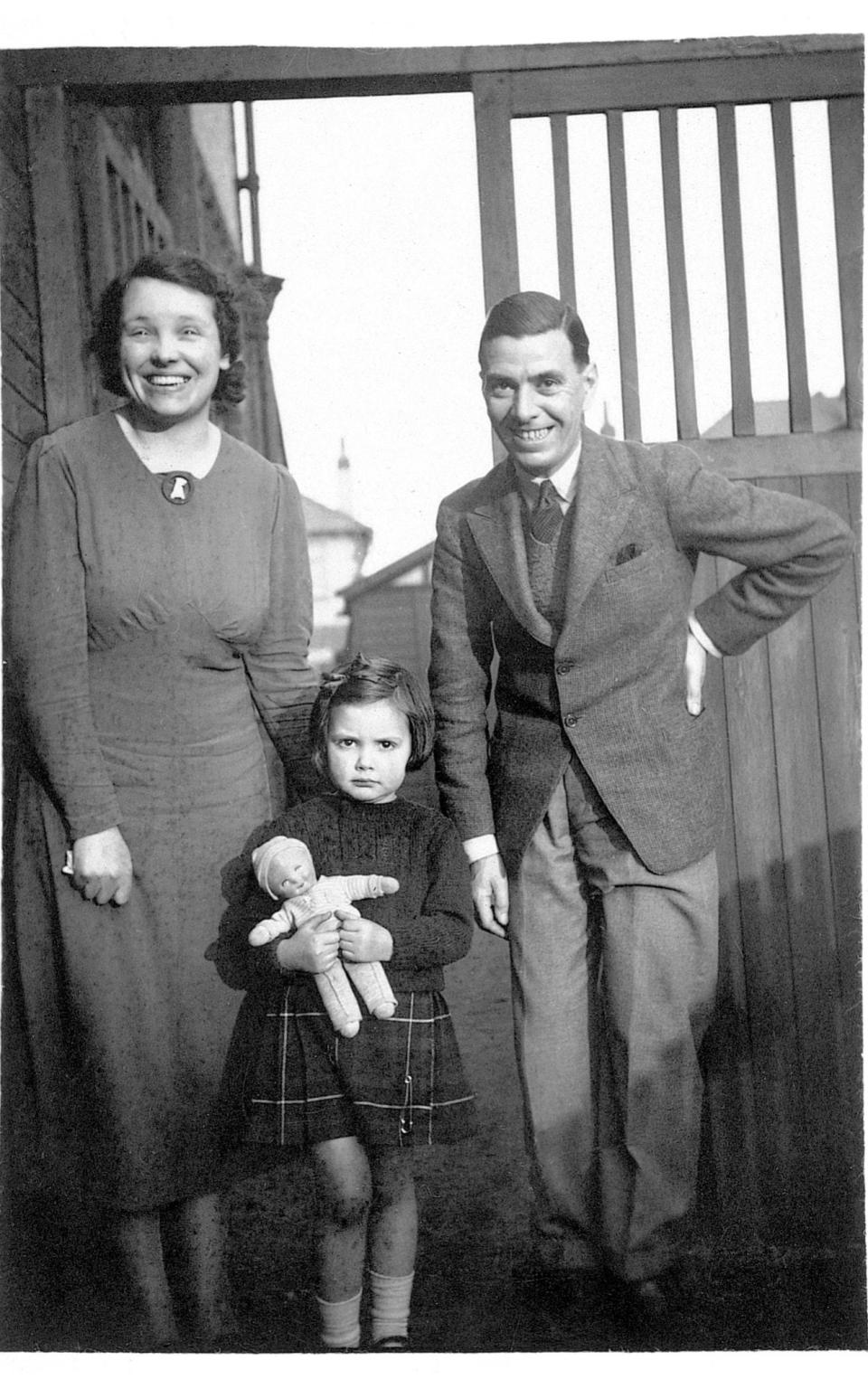
Wakes Week was when the Lancashire factories closed down for their annual summer holidays.
My father’s engineering firm always had two weeks off every August. And we always went to Blackpool. I thought it was the most glamorous place on Earth.
We’d take the train from Stockport. It took about an hour. A thrilling journey, because as you neared Blackpool you could see the tower on the horizon and that was the great iconic building.
And then it was sandcastles day after day. We made all kinds, ones with moats that would be filled by the sea. Ones with little cellophane windmills that caught the wind. My father used to bury me in the sand in what looked like a car, with me sitting in it.
There were donkey rides and Punch and Judy, or the Pierrot show on one of the three piers where you sat in rows of deckchairs.
We stayed in Cleveleys. My mother thought it was socially superior, but it was actually just duller. We always stayed in a traditional boarding house with buckets and spades in the porch where you took off your sandals so the sand didn’t get inside. You had your three meals a day at the boarding house but after your meal you had to leave. You couldn’t hang around.
So it was off to the beach for sandcastles or a walk along the prom for people-watching. I learnt ballroom dancing on the floor of the tower.
Once a week we’d go to one of the spectaculars and see someone like Arthur Askey, or Anne Ziegler and Webster Booth, a husband and wife contralto and baritone. She wore very pretty frocks, for me that was the ultimate in glamour.
Even though it was during the war, it was a happy time. I was delighted with happiness, being with my family, my sister, doing what I wanted all day, a routine. I can still remember running around with bare feet on the rigid sand, because of course the tide came in twice a day.
Simple pleasures are asserting themselves these days and I have such vivid, tactile memories. The touch of the sand, the feel of the salt, the bracing Blackpool air.
Jeremy Vine, broadcaster, remembers Newquay
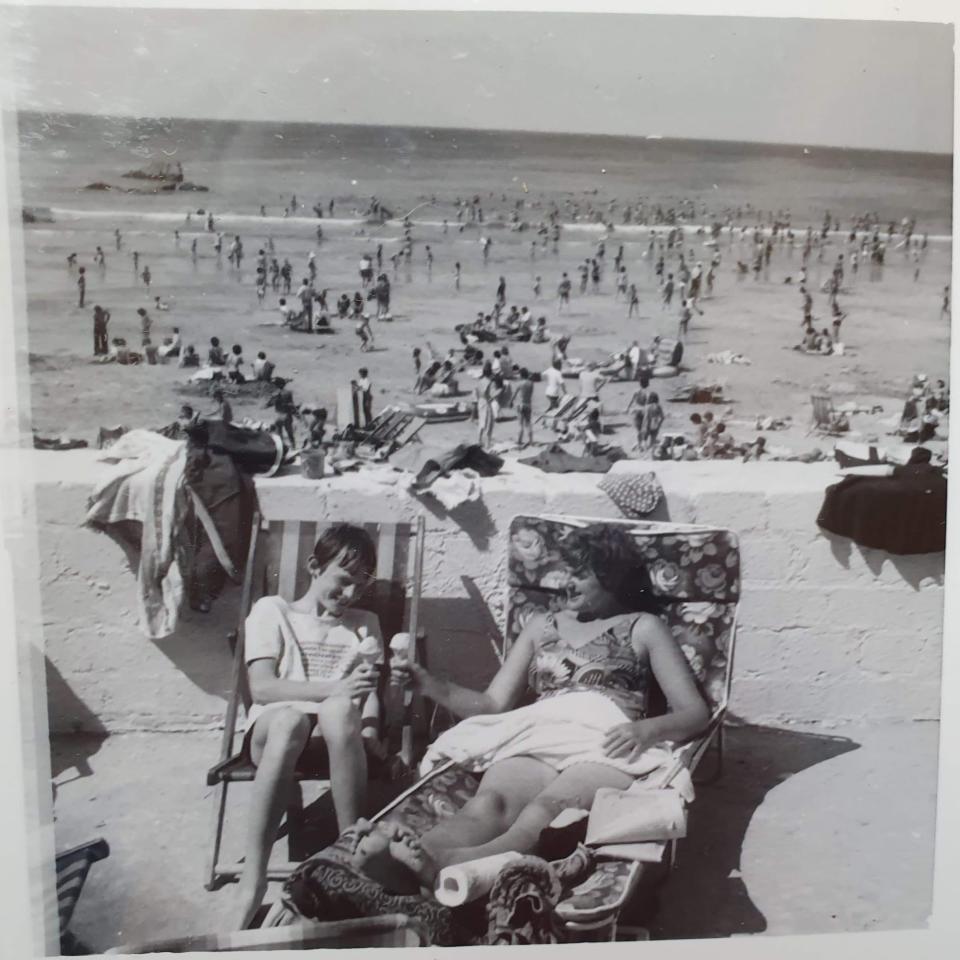
The journey from Cheam to Cornwall seemed to go on for most of my childhood. All five of us packed into the Dormobile. I still remember the number plate, MPH 842L; that car was a big part of our life. Packing for a family of five is a heck of a lot of stuff if you’re camping and self-catering.
Holidays were as much about the packing, the leaving and the arriving. The whole thing was really quite a military operation.
We would rent a beach hut overlooking Lusty Glaze beach. Mum and Dad would be in deck chairs on the concrete balustrade in front of the beach huts, while we’d be on the beach doing what we called surfing, but was actually bodyboarding on polystyrene boards. It was brilliant.
My parents would always talk to everyone around them. They would come back from holiday having made new friends, whom they’d actually keep in touch with. Something that as an adult I don’t relate to at all.
We were still going down there when I must have been 17, because I remember Elvis Costello’s album Punch the Clock had just come out. I was into the whole punk, Stiff Little Fingers and Sex Pistols scene and would listen to cassettes on my ghetto blaster. I look ridiculous in the photos, but it was considered cool to be very angry indeed, even if you didn’t have much to be angry about.
They were wonderful holidays, even if we hadn’t got a clue about sunburn. Back then was a good time for lying about reading because there was no social media.
I still remember the day a seagull dive-bombed my mum outside the beach hut with absolute precision. She was screaming, “I’ve been bombed”, while we all roared with laughter.
Jeremy Vine’s debut novel The Diver and the Lover is published in hardback, ebook and audio on Sept 3 (Hodder & Stoughton)
Dame Jenni Murray, broadcaster, remembers the Isle of Wight
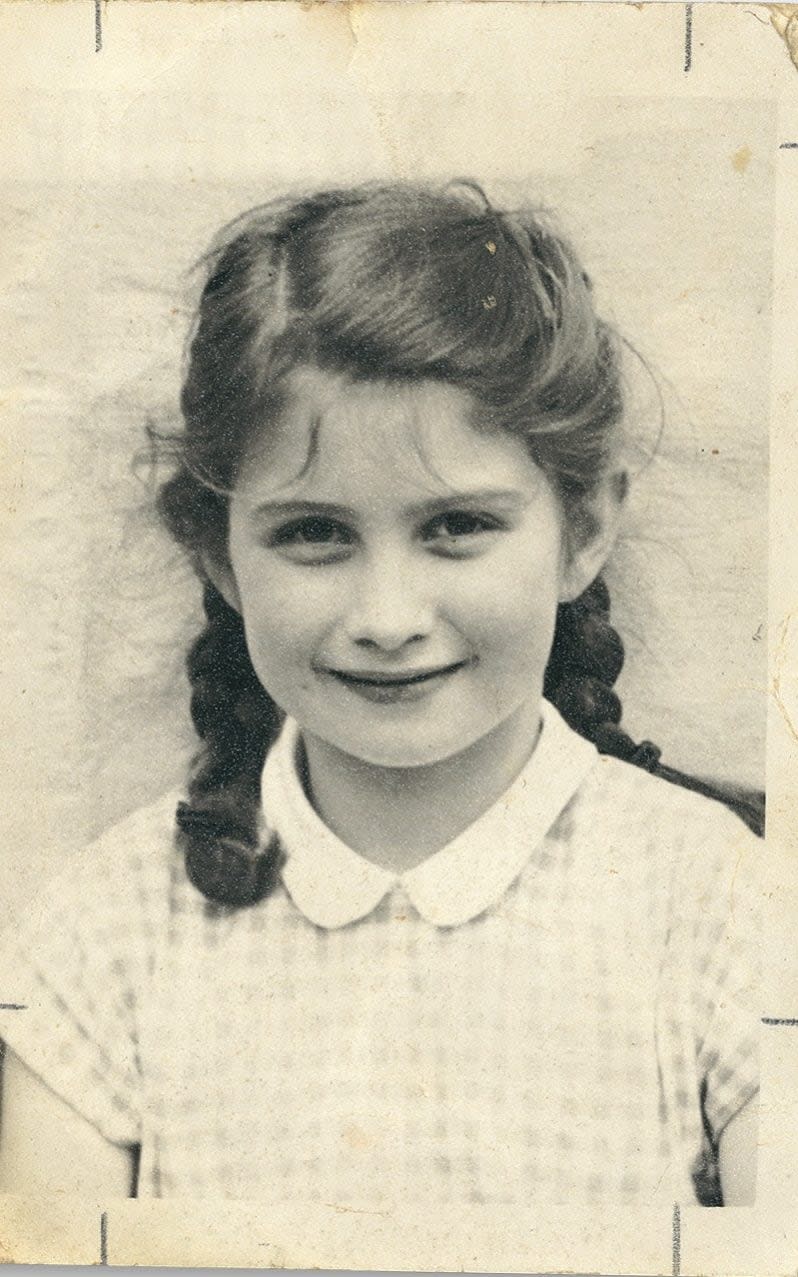
We used to go to Blackpool a lot when I was a kid, because it wasn’t very far away from our home in Barnsley. Then when I was six my father decided we should go a little bit further, and kind of abroad, which of course the Isle of Wight isn’t, but you have to go across the sea to go to it.
I remember driving down to Southampton and taking the ferry across to Cowes and how exciting it was to cross the sea, even though it was only the Solent. We then drove all over the island, stopping in B&Bs. There were no fancy hotels for us.
What I remember best about it is going to the cliff and there were The Needles with the lighthouse at the end. How amazing. The cliff has coloured sand in layers. My dad said: “Come on, we’ll go to the gift shop and get one of the tubes with all the coloured sand in it.” But I insisted I wanted to dig my own. It’s probably risky to dig bits of sand out of the cliff side, but I had a little jam jar and spade and I very carefully took little bits of it out and took it home. I don’t know what happened to that jar…
We went several times as a family and much later, I returned when I was a television reporter in Southampton.
The best ice cream I’ve ever had in my life was from Minghella’s. Much later I interviewed old Mr Minghella, and I told him how much I loved his ice cream. His son Anthony [the late film director] had been at Hull University at the same time as me. So we chatted – and I ate quite a lot of his ice cream as well.
My husband and I have recently moved down to the coast near Lymington and what I love more than anything is sitting on the little promenade at places like Barton on Sea, where I can see The Needles and the very cliffs where I dug out the sand.
Right the way through my life the island has had significant memories.
I say to my husband, “Why don’t we go over to the island?” and he says, “Have you seen the cost?!” But I will persuade him.
Jenni Murray is the author of Fat Cow, Fat Chance and A History of the World in 21 Women
Konnie Huq, broadcaster, remembers Brighton

I’m not kidding when I say I grew up thinking Brighton was miles and miles away from London. Mum would pack sandwiches and a flask of tea. I’d take my little bag and I’d have my pens and crosswords in it. It was only when I was in sixth form that I realised Brighton is an hour away.
It didn’t help that I would get car sick. I remember having to stop on the hard shoulder for me to puke. I remember our car had leather seats and they would burn your bum if they got hot. And those gold tins of travel sweets in the white powder that you can still get!
We had friends who lived in Brighton. I could say relatives, but “relatives” in the Bangladeshi community really means other people from Bangladesh.
For years I thought all beaches were pebbly. Brighton was amazing until years later I graduated to a sandy beach. Back then, though, we’d spend our days on the beach or pier. It was the pier that was the real novelty for my sisters and me.
I never got pocket money growing up, so it was a luxury asking for 2p or 5p to go on the coin-push machines. The Space Invaders machine was 10p! If I managed to get a game a day on a proper arcade machine I was living the dream.
We didn’t eat out. It would be sandwiches on the beach and every once in a while we might get fish and chips. My dad was a trainee actuary at the time and later on in life, after he started his own business, we started doing more wild things, like going to Little Chef.
Even now my pleasures are very simple. All I need is to be by the sea, looking across to the abyss where the water meets the horizon. Having grown up and lived in London, there’s something very liberating about it.
Cookie and the Most Annoying Girl in the World by Konnie Huq (Piccadilly Press) is out now
Patrick Grant, fashion designer, remembers the Isle of Mull
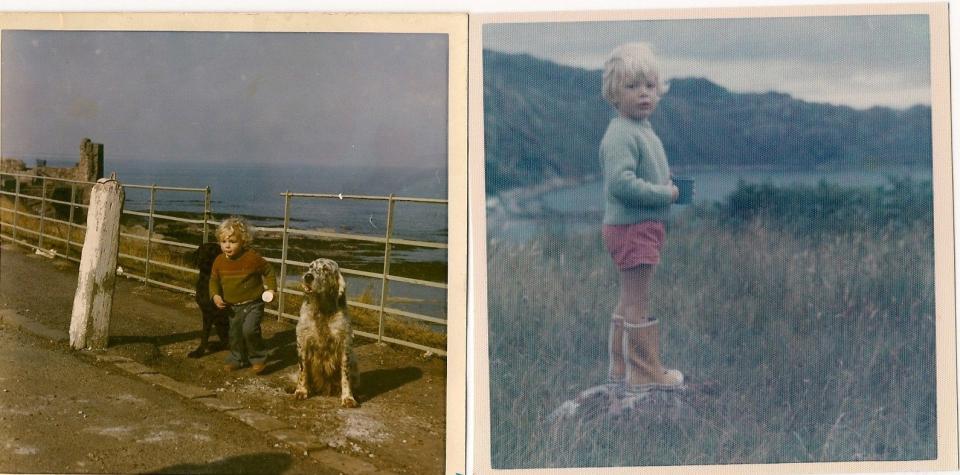
Mull is where, without embarrassing my mother, my life began.
It’s a beautiful place. It’s only a few hours’ drive and a ferry. All the family, my sister and me and the dogs would be piled into the car at our home in Edinburgh, along with camping equipment, and we trundled through the Trossachs, amazing in itself, to get there.
If you fly to Majorca, it doesn’t feel like you’re on an island so much, but going to Mull, you feel like it’s an adventure from the moment you get on the CalMac ferry. On a sunny day the dolphins will follow the ship and jump through its wake.
I still visit once every couple of years and it hasn’t changed. Time slows down in the Hebrides. It’s a magical landscape and when the sun shines in there’s nowhere on Earth that’s as stunning. It never really gets that hot, in the summer a really hot day would be 20C (68F), but the beaches are empty. You can be on a mile of white sand.
Rock pooling was my thing. I loved being in the water, scooping hermit crabs out of rock pools. I’ve seen sea otters, and all sorts of brilliant bird life, and thousands of seals. If you go out on a little boat you won’t fail to see seals loafing about. The whole thing felt like a Famous Five adventure or The Black Island from Tintin, with ruined old castles and shipwrecks on the beach.
My nephews now love it. They’re both wildlife fans and the pastel shades of Tobermory are such fun for kids; it also happens to be where Balamory is filmed. I’ve just come back from camping in the Lakes and it’s easy to forget how spectacular the scenery is on our doorstep. Way back, my dad’s family were hill farmers and I think there must be something genetic about being in that scenery, despite the occasionally inclement weather.

